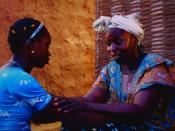Female Circumcision: Good Tradition or Not
Traditions often make positive contributions to a
culture or society, but sometimes fall short and need to be
reevaluated. The African tradition of female circumcision
is one of the few traditions that needs to be reevaluated.
Originally, female circumcision was practiced to ensure
female virginity until marriage. Today people are
educated, and more open to the fact that women are not
possessions, they are able to make their own decisions on
what they would like to be done to their body. Therefore
there isn't a need for this tradition.
Female circumcision is a very dangerous and sometimes
deadly tradition. The procedure is not preformed by
licensed doctors, it is preformed using unsterilized tools
that are extremely painful to the female. There are many
side effects to this procedure.
The immediate risks after the procedure are hemorrhage, severe pain, and infection. The most severe consequence is death due to excessive blood loss.
Long term complications include scarring, interference with the drainage of urine and menstrual blood, chronic urinary tract infections, pelvic and back pain, and infertility. Sexual intercourse can be painful. Complications of childbirth are also a risk. It is unclear whether it is related to the procedure itself, or related to the general condition of medical practice, but infant and maternal death rates are generally higher in those communities where female circumcision is practiced. (Altha Roberts Edgren).
Dr. Adeline Apena said "Female circumcision has been
perceived as an act of barbarism, savagery, torture and
maiming which deprives African women of their femininity,
especially with regard to sexual sensitivity and pleasure."
Female circumcision is an abuse of a woman's
individual rights. "The young girls and women who undergo
circumcision do not have individual legal status and rights
apart from those of their communities and...



Other side?
I agree with the author that this is an unacceptable tradition, but he/she did not write any comments concerning the other side to female circumschism.His title is: Good tradition or not? Well, what happened to the good part?
22 out of 22 people found this comment useful.